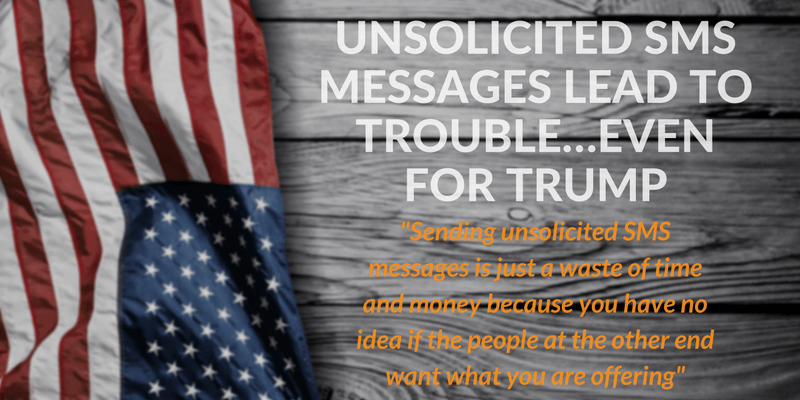Unsolicited SMS Messages Lead to Trouble…Even for Trump

Late last month reports surfaced that the Trump US presidential campaign had sent unsolicited SMS messages to voters in the Chicago area. One man, Joshua Thorne, and his lawyers have filed a class-action lawsuit alleging the Trump Campaign violated the Telephone Consumer Protection Act (TCPA, the US equivalent of the PECR).
In the US, the electronic communications laws are stricter than the UK. The TCPA requires a specific opt in for every campaign. This means you cannot send any SMS messages to a person without their explicit consent to do so.
Thorne insists he never gave his mobile number to the Trump campaign and he never agreed to have them send him information. The legal documents of the case say Trump’s campaign rented a shortcode from the SMS messaging service Tatango, who provided them with documents on how to be compliant with the TCPA. According to an article in the Chicago Tribune, the messages were sent to “thousands of wireless telephone numbers or randomly generated phone numbers using a bulk messaging software by the company Tatango Inc.”
It’s not clear from the article if the lawsuit claims Tatango has any responsibility for the messages or not. I couldn’t verify if Tatango’s software actually generates random numbers as one of the articles asserts. But they clearly define an anti-spam policy stating “Tatango has a zero-tolerance policy for SMS spam, meaning that subscribers will only receive SMS messages from campaigns that they have opted into.” My take is that if the Trump campaign used random numbers, they likely got them from somewhere else. Likely they used the same “robocall” techniques they have for making automated voice calls to residents. Or they used phone numbers from donor information, possibly without getting express permission to send SMS messages. Either way, they would be in violation of the TCPA.
While Thorne filed a civil lawsuit and the outcome is unknown at this point, the FTC and FCC (US equivalents of the ICO) can still do their own investigation. If they find that the TCPA was violated they can issue a fine of up to $1,500 per message (~£1030).
The lawsuit assumes others had the same experience and that the court will assign a “class action” status which covers anyone who received an unsolicited message from Trump. They are suing for “statutory damages to all class members; to stop the text messages to wireless phones through the use of an automatic telephone dialing system without prior express consent; reasonable attorneys’ fees and costs; and any other relief the court deems reasonable and just.”
The UK law
The PECR sets out the regulations for electronic communications in the UK. You are allowed to contact someone if they are already a customer, or have made an enquiry. However, you can only send messages that relate to their prior purchase or contact.
For example, if you’re a salesman who just sold a car to someone. You can contact them with information on car insurance or car-related topics. You can’t contact them about a great deal for a vacation in the Bahamas or movie tickets. If you want to send them other direct marketing messages, you’ll need to get them to opt in to receive them.
Besides staying compliant with the PECR, you don’t want to send unsolicited SMS messages anyway. One of the best things about SMS marketing is that the people who opt in are really interested in what you have to offer. The ROI is usually quite high because of this. It’s like having a willing partner in your business – you send things, they want things. Sending unsolicited SMS messages is just a waste of time and money because you have no idea if the people at the other end want what you are offering – in other words, you’re losing the advantage that SMS marketing offers in the first place.
If you have questions about using SMS marketing and staying compliant, download our special report, Mobile Marketing Guide. In it, you’ll find an overview of SMS marketing, best practices, and legal guidelines.
Related Articles
Be Careful When Reading About Shortcodes and VMNs
When you start using SMS marketing, one of the first decisions you need to make is whether or not you’ll need to get replies. If you do, then you’ll need to decide between shortcodes and a virtual mobile number (VMN, also called longcode). If you don’t, then that’s alright too.
Why You Need a Blacklist and What It Can Teach You
One of the major metrics in SMS marketing is how many people opt in to receive your messages. But there’s a flip side to that metric: how many people opt out. In the ideal world, no one would ever leave your list and instead continue to make purchases or support your organisation for as long as you decide to message them.
3 Compliance Tips for Your Next SMS Marketing Campaign
When conducting an SMS marketing campaign, there are a number of compliance regulations you should be aware of, to ensure that your communications are as effective as possible, without being potentially damaging to your campaign or your business. If you're marketing to a UK market, the UK Privacy and Electronic Communications Regulations (PECR) gives clear guidelines on what falls within the rules. Here we've highlighted some key tips to ensure your next campaign is compliant, based on common questions that arise.
What You Can Learn About SMS Marketing from These 7 Companies
The Information Commissioner’s Office (ICO) issued seven monetary penalties against companies this year. We’ve read through them all – so you don’t have to – and discovered two lessons every company should learn about SMS marketing if they want to be successful.
A review of the EC directive for SMS marketing
5 Common Questions About SMS Marketing Compliance
Electronic marketing is a tricky thing. There are rules and regulations you need to follow, and it can all seem pretty intimidating at first. To help you get started, I’ve gathered five of the most commonly asked questions about SMS marketing and the regulations and summed them up here.
Can You Send Anyone a Text Message?
Can you send SMS messages to whoever you like whenever you like? If that's what you believe read this article which explains what restrictions apply to broadcast messaging, what is the best way to build a permission based SMS marketing list. Understand that and you can safely make a start.
How important is it to run an SMS opt in campaign?
SMS Marketing: Ensuring Compliance with the Law
All businesses are subject to the law when it comes to advertising and marketing. Companies cannot make false claims or mislead consumers via advertising materials, for example. Designed to protect consumers and commercial clients, the law regulates most forms of marketing in some way. With companies carrying out various forms of marketing activity, it can be difficult to keep on top of the relevant laws and guidelines. By working with SMS marketing experts, however, you can ensure that your marketing campaigns are fully compliant with the necessary laws and that you’re able to connect with your target audience lawfully and effectively.












